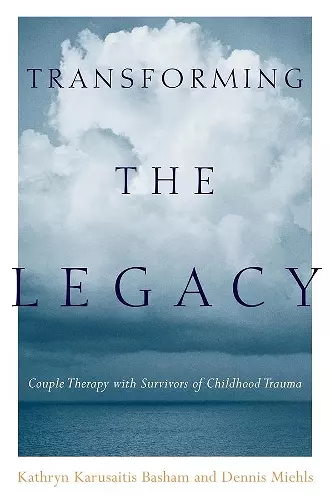Transforming the Legacy
Couple Therapy with Survivors of Childhood Trauma
Dennis Miehls author Kathryn Karusaitis Basham author
Format:Hardback
Publisher:Columbia University Press
Published:12th Nov '04
Currently unavailable, and unfortunately no date known when it will be back

To serve the increasing numbers of individuals who have endured childhood trauma, survived interpersonal and domestic violence, or as refugees, have sought asylum from political violence, armed conflict, or torture, the authors present an innovative couple therapy model grounded in a synthesis of psychological and social theories. Replete with case histories, the book emphasize how couple therapy transforms the legacies of childhood traumatic events (i.e., sexual, physical, and/or emotional abuse).
Presents a relationship-based and culturally informed couple therapy practice model to serve the increasing numbers of individuals who have survived interpersonal and domestic violence, or as refugees, have sought asylum from political violence, armed conflict, or torture. This title is useful for clinicians in a range of professional disciplines.To serve the increasing numbers of individuals who have survived interpersonal and domestic violence, or as refugees, have sought asylum from political violence, armed conflict, or torture, Transforming the Legacy presents an innovative relationship-based and culturally informed couple therapy practice model that is grounded in a synthesis of psychological and social theories. This unique couple therapy model encompasses three phases of clinical practice: Phase I entails a process of establishing safety, stabilization, and a context for changing legacies of emotional, sexual, and/or physical abuse. Phase II guides reflection on the trauma narrative. The goal of phase III is to consolidate new perspectives, attitudes, and behaviors. Within these phases, the model-illustrated with rich case studies-focuses on specific issues, including: intersubjectivity between the client and clinician (such as transference and countertransference, vicarious traumatization, and racial identity development); intrapersonal, interactional, and institutional factors; the role of the "victim-victimizer-bystander" dynamic in the couple and therapeutic relationships; preserving a locus of control with clients; flexibility in decisionmaking regarding clinical processes; and specific practice themes, such as the composition of a couple, the role of violence, parenting, sexuality, affairs, dual diagnoses, and dissociation. A dramatic departure from formulaic therapeutic approaches, this biopsychosocial model emphasizes the crafting of specific treatment plans and specific clinical interventions to show how couple therapy can transform the legacies of childhood traumatic events for a wide range of populations, including military couples and families, gay lesbian/bisexual/transgendered couples and families, and immigrant and refugee couples and families. This thorough attention to issues of cultural diversity distinguish Transforming the Legacy from the current literature and make it an invaluable resource for clinicians in a wide range of professional disciplines.
This readable, optimistic volume covers history, theory, practice, case vignettes, case illustration, and issues of therapist involvement...Highly Recommended. Choice This book adds to the literature of couple therapy because of its well-developed depth of presentation. -- Debra Nelson-Gardell Social Work Transforming the Legacy is an outstanding resource... This book should be required reading. -- Katherine van Wormer, MSSW, PhD Journal of Social Work Practice in the Addications This book is a tour de force... [and] needs to be read from beginning to end. -- Marcia Kraft Goin Community Mental Health Journal
ISBN: 9780231123426
Dimensions: unknown
Weight: unknown
368 pages